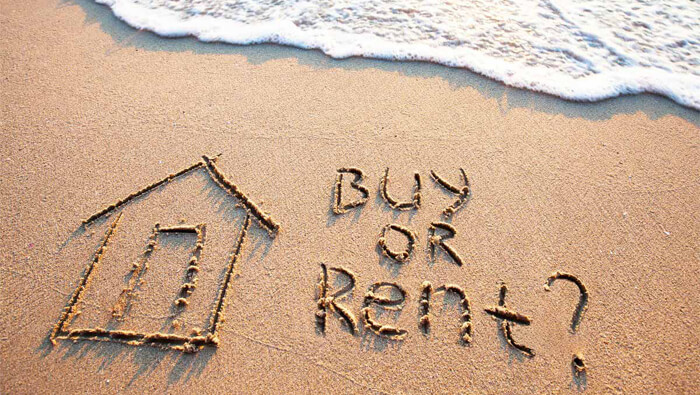Key takeaways
- Only buy a home if you can afford it and you plan to stay for at least five years.
- Emergency savings should be three to six months’ worth of expenses in a high-yield savings account.
- A down payment of 20% is ideal, and a lower debt-to-income ratio and higher credit score improve the chances of approval for a lower-interest rate.

What’s the deal, then? Is it worth plunking your savings on a piece of real estate? Or better to keep renting for a period of time— perhaps until the end of time? We do have an answer.
You have always been convinced that the greatest accomplishment is buying a house — the American Dream, brick-and-shingles, fenced-in-backyard embodiment. But only about one-third (37 %) of millennials between the ages of 25 and 34 own homes. And of those who do, 63% actually regret their home purchase, with the top explanation being a quarter citing “unforeseen repairs or hidden costs.” In fact, renting is cheaper than buying in more than half (59 %) of U.S. housing markets.
What’s the deal, then? Is it worth plunking your savings on a piece of real estate? Or better to rent for a period of time or until the end of time? The brief truth: If you can afford the down payment on a home that is likely to appreciate, and you intend to stay on the property for at least five years, you can go for it. The long answer to that is all below.
1. Do you need to rent a house or buy one? Let’s run the numbers.
Of course, the most critical first step in the rent / buy decision is to decide whether you can afford to purchase a home, and if so, whether you can afford as much of a home as you like. Before you go any further, look at the numbers below:
- Emergency savings: You can only consider buying a house if the expenses saved in an emergency fund are already three to six months old. We know that we're telling you this all the time, but yeah, that won't stop us from saying it again: Having an emergency cash balance on a high-yield account — we like our FDIC-insured Wealthfront Cash Account, which currently has a 2.51 % APY — is one of the most important building blocks of good financial health and should come before any other investment, including buying land.
- Down Payment : While in some situations you can buy a home with a down payment that is as low as 3% of the purchase price, doing so means taking on more debt. It is usually a safe idea to wait until you have enough cash to cover the amount you have to borrow, unless there is an extremely compelling reason to take the plunge before you get a 20 % down payment. 20% may sound like a lot, but as a homeowner, it will save you money on interest and private mortgage insurance (PMI) and put you on a better financial footing. Plus, take note that you'll still need enough cash on hand to cover the closing costs, which is usually around 3% of the buying price.
- Debt-to-income (DTI) ratio: Lenders look at your “front-end” and “back-end” DTI when deciding whether to work with you. To calculate your front-end DTI, divide your projected monthly housing expenses (mortgage plus taxes plus insurance) by your monthly gross income; for the back-end, divide all of your monthly expenses (including projected housing, loan, and credit card payments) by your monthly gross income. Most lenders are looking for a front-end DTI below 28% and a back-end below 33%. If you’re not there yet, you should wait to buy until you’re in a stronger financial position.
- Credit score: The higher your score, the better your chances of getting a lower-interest rate and getting accepted. Not being dramatic, but even a single percentage point is important here. For example, on a $400,000 mortgage, the difference between an interest rate of 4% and 5% will cost you $68,000 over 30 years. Before contacting the mortgage broker, it is worth doing all you can to raise your score, even if that means holding off on buying a home for longer.
- Investment accounts: Whether or not, and when and how much to tap into your savings to get cash for a down payment... that's a personal call that depends on a variety of personal variables. Create a strategy in which you feel good about. This being said, taking a down payment from your retirement accounts is simply a cry for rescue. Don't get us to talk you down. Leave your retirement alone. Making a withdrawal means you'll definitely face charges and taxes, not to mention removing an important source of compound growth and diversification from your potential income. It's not a smart idea to purchase a house if it needs you to put your retirement at risk.
2. Think about your 5-year plan (or, you know, think about making one).
Let’s presume that all your number add up, and you’re in great financial shape to buy a house. Congratulations. So now is the time to ask yourself: “Where do I want to be five years from now?” When the answer has a definite geographical position attached to it, it is a good choice to buy a home. But if you’re not quite sure where you’re going to live in the next couple of years, you may want to consider renting before you figure that out. Renting not only gives you more freedom to lock up where you want to be, but it’s usually cheaper in the short term too.
You should only purchase a house if you intend at least five years in it. This will allow you ample time to recoup the costs of buying and selling, such as legal and bank charges, fees, and inspections. For example, if your home appreciates 2% a year, it will appreciate 10% in five years. Selling it would cost you 6% of the value of your home because of the brokers ‘fees. You must also pay the closing costs in advance and a 1% annual maintenance fee. That’s why it’s so crucial to look for a home that’s likely to appreciate — our free planning feature can be extremely helpful in scanning this out before you buy a house by showing you patterns and projections based on multi-source data — and not selling it for at least 5 years.

The sum charged to the principal begins surprisingly minuscule because of the way mortgages are amortized and rises gradually over time. Say you’re taking out a $300,000, 30-year fixed mortgage at an interest rate of 4.5%. When you make your first $1,520 payment, there will be a whopping $1,125 of your payout going to interest, and a mere $395 to pay down your principal. (The word you’re looking for here is “oof.”) It would take about 15 years for your payments to become more of an interest than a principal one.
Although you’ve already heard of homeownership’s tax advantages, recent changes in tax laws have made renting more attractive to many Americans. While you can subtract the interest charged (up to $750,000 on mortgages), you’ll need to itemize — which has become less popular as the standard deduction has risen to $12,000 for single and $24,000 for joint married filers. The number of state and local taxes you can deduct (SALT) is now also capped at $10,000.
3. Renting vs. buying doesn’t have just one clear answer.
Let’s get one thing out of the way: A home isn’t always “good investment,” and renting isn’t always “wasting away money.” At least, when you pay rent, you get shelter in exchange, which isn’t nothing. If you pay rent, then cheers! You have a place to stay, so this puts you in a stronger spot than others, and it’s not a bad thing to centralize in the argument over “renting vs. buying “— you’ve got shelter, and every additional benefit you may gain from your housing circumstance is gravy.
In addition to getting a real roof over your head, renting a home could be what helps you to save money on a potential home purchase downpayment, or start a business. It might allow you to live close to a job in a city where you can’t afford to buy a home right now (or ever). When you can unhook yourself (and you really need to) from the housing system that makes us assume that renting is essentially inferior to owning in all situations, you would be less likely to have an emotional understanding of owning a home and open up to the idea that renting may be more beneficial to your goals and circumstances.
The long-term returns of owning a home aren’t so clear-cut either. According to Nobel Prize-winning economist Robert Shiller, between 1890 and 1990 the return on investment on homes has hovered around — wait for it — 0%. On the other hand, the S&P 500 averaged annual returns of approximately 10% between 1926 and 2018.
That may be why Florida Atlantic University scholars suggests renting is always a better financial choice than buying. Their work indicates that continuing to rent, and spending the cash you would otherwise put into a house (for a down payment, renovations, taxes, etc.), could potentially generate more wealth than purchasing.
The catch: You must be extremely diligent to simply invest the extra money and not waste it on, say, a new Tesla or take-out sushi worth a lot. We don’t mean you can’t buy a car or order takeout, only that you have to agree on a budget and create financial plans that include spending on the regular — and you have to stick to that. If that seems daunting then throwing your cash into property might be a good way of locking up your assets for your future self so that your present self can’t go too wild.

4. Scope your location
No discussion between renting and purchasing a home without a close look at the specific housing market. Think about the type of home you want — size, amenities, design, etc .— and then research the hell out of renting and buying prices in your region. Warning: during this part of the cycle you can become addicted to Zillow but honestly there are worse things.)
When you have those numbers in hand, plug them into one of the many online calculators for “renting vs. buying” built to help you make this decision. If you are more of a DIY guy, measure the price-to-rent ratio by dividing the dividing your city’s median home price by its median annual rent. Generally speaking, the lower the ratio, the smarter it is to buy; the higher, the better you’re likely to be renting out.
While it may be tempting, making an apples-to-apples comparison of your hypothetical monthly mortgage payment and actual monthly rent is inaccurate. Homeownership comes with an unavoidable slow drip (or, depending on your luck, crushing deluge) of extra costs including maintenance, taxes and insurance. Experts advocate budgeting 1% of the home’s purchase price annually for maintenance and repairs alone. That’s why we suggest using the calculators, at least to give you an idea of what makes sense to you.
Finally, you should research trends and forecasts about real estate in your area. When you live in a place where house prices are rising more quickly than inflation, if you want to buy, you might come out ahead. Conversely, if there’s so little appreciation, you will be better off renting.
5. Uh oh, time to think about your life.
If you’ve crunched all the numbers, done all the analysis, and still, you don’t get a straightforward answer, we’re saying two things do. Next, carry on renting now. Although not all signs point to “buy a home now — it is definitely a very good decision! “As you collect confidence (and save more cash for your down payment) for a potential future home purchase, you might just as well cool it in your rental. So spend some time immersing yourself in the fuzzier aspects of your life and future, from the comfort of your rented home; the countless intangible things that will affect your decision.
- Planning on having kids? Would you know where to raise them, or where to go to school? What's the home-buying landscape like?
- Do you see yourself changing jobs in a few years or are you in the near future committed to your city?
- Are you able to trade in your leisure weekends – hiking, visiting breweries, brunching – to patch sinks and mow the lawn? Because that is what homeowners do. The wedding is the signing of closing papers, the honeymoon is the move-in day and the real marriage is homeownership. There'll be stress and hard days, and bailing is not as easy if things get really bad like when you were “dating” a rental home. (Yeah, you might just call us romantics.)
- What's it like to own a house that appeals to you? Is it having a physical place to make your own, to really invest in, not just financially but personally? On the flip side, are you mostly looking to make a financial investment? Is it just something of a status? Do you feel like at this point in your life you should be buying a home? Where does the pressure come from? Yeah, we're not therapists and we don't make any promises to know what to do with those responses. What we're saying is ... it's worth talking about. The most important thing to note is that owning a house isn't the financial adulthood be-all-end-all. Renting is simply not a symbol of an untimely financial life. Renting may be simply the right option for a lot of people, at least for a period of time. And that is perfect. So first let yourself believe that. It’s honestly pretty freeing.
6. How badly do you want it?
This, too, matters. If the cold numbers always leave you a little on the fence when it comes down to it, but emotionally you are genuinely in love with the thought of finally owning a home that is truly yours, then go with that. Let your logic pave a path for your emotional fulfilment when it comes to buying a home. A home isn’t just something that you own — it’s a place where you live for the rest of your life. Weighing your emotions as strongly as you wish is more appropriate.












